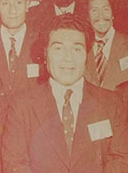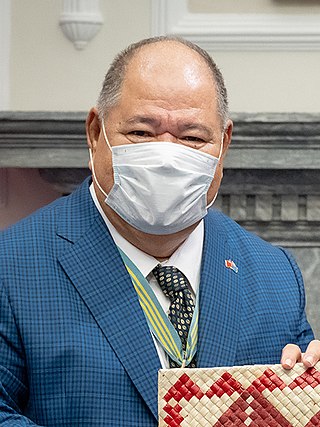The politics of Tuvalu takes place in a framework of a parliamentary representative democratic monarchy, whereby the monarch is the head of state, represented by the governor-general, while the prime minister is the head of government. Executive power is exercised by the government.
Sir Tomasi Puapua is a political figure who represented Vaitupu in the Parliament of Tuvalu. He attended the Fiji School of Medicine and the Otago University Medical School. He married Riana Puapua.

Sir Toaripi Lauti was a Tuvaluan politician who served as chief minister of the Colony of Tuvalu (1975–78), as the first prime minister following Tuvalu's independence (1978–1981) and governor-general of Tuvalu (1990–1993). He was married to Sualua Tui.
Tuvalu elects a legislature on a national level. The Parliament of Tuvalu has 16 members, elected for a four-year term in 8 double-seat constituencies. Tuvalu is a de facto non-partisan democracy since it does not have political parties. The political system is based on personal alliances and loyalties derived from clan and family connections. It does tend to have both a distinct government and a distinct opposition. The 16 members of the current parliament are elected from eight two-seat constituencies via plurality block voting.

Bikenibeu Paeniu, PC is a politician from Tuvalu. He represented the constituency of Nukulaelae in the Parliament of Tuvalu. He has served twice as the Prime Minister of Tuvalu, and now serving as Tuvaluan ambassador to Taiwan since June 2022.

The Parliament of Tuvalu is the unicameral national legislature of Tuvalu. The place at which the parliament sits is called the Vaiaku maneapa. The maneapa on each island is an open meeting place where the chiefs and elders deliberate and make decisions.

Sir Kamuta Latasi is a political figure from the Pacific nation of Tuvalu from Funafuti atoll. He was elected to the Parliament of Tuvalu in 1992. Latasi served as the 4th prime minister, and foreign minister, from 1993 until 1996. He has served as the Speaker of parliament from 2006 to September 2010 and again from December 2010 to March 2014.

Apisai Ielemia was a Tuvaluan politician. He served as the tenth Prime Minister of Tuvalu from 2006 to 2010, and also held the role as Foreign Minister. He was returned as a member of parliament in the 2010 Tuvaluan general election. He was re-elected to parliament in the 2015 Tuvaluan general election. On 5 October 2016 Chief Justice Sweeney of the High Court of Tuvalu declared that Ielemia’s parliamentary seat was vacant as he was not qualified to be a member of parliament, as the consequence of the short time the opposition MP served time in jail following his conviction on 6 May 2016 in the Magistrate’s Court of charges of abuse of office during the final year of his term as prime minister. The abuse of office charges related to payments deposited into a National Bank of Tuvalu personal account. The 5 October 2016 decision of the Chief Justice was controversial as it appeared to contradict the June 2016 decision of Justice Norman Franzi of the High Court of Tuvalu that had quashed Ielemia’s conviction and acquitted him of the abuse of office charges. The appeal to the High Court held that the conviction was "manifestly unsafe," with the court quashing the 12-month jail term.
General elections were held in Tuvalu on 3 August 2006 to elect fifteen members to the Parliament. There were 5,765 eligible voters on the electoral roll. 32 candidates, including 2 women, competed for the 15 seats. All fifteen candidates elected were Independents, as there are no political parties in the country.
Parliamentary elections were held in Tuvalu on 16 September 2010. Voters elected fifteen members of the Parliament to a four-year term. All candidates were independents, as there are no political parties in the country. Ten out of the fifteen incumbent members were re-elected. The remaining five incumbents, including Deputy Prime Minister Tavau Teii, did not retain their seats. The incumbent Prime Minister, Apisai Ielemia, retained his seat in Vaitupu constituency. On 29 September, Maatia Toafa from Nanumea won eight of the fifteen votes to become Prime Minister.
The Cabinet of Tuvalu is the executive branch of the government of Tuvalu.
General elections were held in Tuvalu on 8 September 1981. Voter turnout was 85%.
General elections were held in Tuvalu on 27 September 1989. Bikenibeu Paeniu was elected prime minister following the elections and formed a five-member cabinet composed largely of opponents of the previous prime minister Tomasi Puapua.
General elections were held in Tuvalu on 2 September 1993. As there were no political parties, all candidates for the twelve seats ran as independents. Prime Minister Bikenibeu Paeniu was re-elected, along with all members of his cabinet, except Naama Latasi. However, supporters of Paeniu held six seats while supporters of the previous Prime Minister Tomasi Puapua held the other six.
Early general elections were held in Tuvalu on 25 November 1993, after the previous elections in September had resulted in a deadlock in Parliament, with supporters of incumbent and former Prime Ministers Bikenibeu Paeniu and Tomasi Puapua holding an equal number of seats.
General elections were held in Tuvalu on 26 March 1998.

Samuelu Penitala Teo is a Tuvaluan politician. He is the son of Sir Fiatau Penitala Teo who was appointed as the first Governor General of Tuvalu (1978–1986) following independence from Great Britain. Samuelu Teo himself served as the Acting Governor-General of Tuvalu from January until 28 September 2021. He had succeeded Acting Governor-General Teniku Talesi and remained in office until the Rev. Tofiga Vaevalu Falani was sworn in as the 10th Governor-General in September 2021.
A by-election was held in the Nukufetau constituency in Tuvalu as the consequence of the appointment of the opposition member of parliament Faimalaga Luka as the Governor-General of Tuvalu.
Henry Faati Naisali, CMG, AO, OBE was a Tuvaluan politician who served as Deputy Prime Minister of Tuvalu (1985-1989), Secretary General of the Pacific Islands Forum (1988-1992) and Pro-Chancellor of The University of the South Pacific (1985-1990). He is notable for co-founding the Tuvalu Trust Fund which lead Tuvalu to achieve greater financial autonomy.
Kitiseni Lopati was a Tuvaluan politician who served as the minister of natural resources and commerce, then as the minister of finance and commerce in the cabinet of prime minister Tomasi Puapua in his second term as prime minister of Tuvalu.






